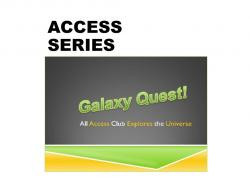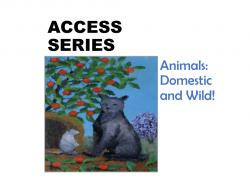Tracie Spinale
Learning Programs Manager
Smithsonian Institution
Middle School (13 to 15 years old), High School (16 to 18 years old), Post-Secondary
Teacher/Educator, Curriculum Coordinator, Parent, Museum Staff
Language Arts And English, Science, Social Studies, Arts, Special Education, Career and Tech Ed, Other
: Museum Studies
Hi there! I am the Learning Programs Manager at the Office of the Under Secretary for Education (OUSE) where I focus on positive youth development programs.
Enjoy!
- Positive Youth Development
- 4-H & 4-H Guide to the Smithsonian booklet
- Boys & Girls Clubs of America
- All Access Digital Arts Program - Collections for teens and youth with cognitive differences
- Distance Learning Resources
- A cultural science series from the Smithsonian Arctic Studies Center in Alaska (#arcticstudies)
- Maker and activity collections about environmental and social justice issues
- Topical collections
- A series on the intersection of Buddhism and Western Science
Tracie Spinale's collections
Access Series: Places "Real" and "Imagined"
<p>Covid-19 has all but put an end to the days of carefree and open travel. However, that doesn't mean that we cannot let our minds wander! </p><p>This topical collection of artworks is based upon a wide variety of places and travel spots, both "real" and "imagined." It features castles, mountains, beaches, forests, capital cities, and fantasy movie landscapes. It was originally used in a collage art activity (printed out; using paper, glue, and art materials); and as a discussion prompt in an informal learning activity with a group of teens with cognitive disabilities during a summer camp program. Students were asked about famous places they have visited or would want to visit, as well as favorite vacation or travel spots. <br><br>Other suggested uses beyond collage and discussion prompts would be a writing exercise, "If you could travel anywhere, where would you go, and who would you travel with, etc...?" Use the visible thinking routine "See|Think|Wonder" as a starting point for the writing prompt, and the images for inspiration.<br><br>Tags: Decision Making, Disabilities, Self-Determination, Self-Efficacy, Student Empowerment, All Access Digital Arts Program, teens in museums, teens, teenagers, after school, out of school learning, informal learning</p>
 Tracie Spinale
Tracie Spinale
56
Access Series: Photo Quest in a Sculpture Garden
<p>Get out on a sunny day and enjoy an art sculpture garden with friends...Wander with a purpose. In this teen group quest, teams use close-up photo prompts to find artworks in a sculpture garden, and then use tablet devices to take team photos with the sculptures. This activity was originally used in the Hirshhorn Sculpture Garden in Washington, D.C. with the All Access Digital Arts Program as a photo scavenger hunt. Example PDFs of photo details are provided. To turn the photo hunt into a more formal learning experience, the answer section shows the entire sculpture with information and discussion prompts to elicit questions about teen identity and self-expression.</p>
<p>With some prep work, this activity could be adapted to other sculpture gardens settings, or permanent collection galleries in a museum. Make sure to confirm the sculpture locations prior to your groups visit--Even heavy sculptures sometimes get relocated or go out for conservation and cleaning.</p>
<p>Tags: decision-making, self-determination, student empowerment, disability, All Access Digital Arts Program, teens in museums, teens, teenagers, after school, out of school learning, informal learning, emotions, socio-emotional</p>
 Tracie Spinale
Tracie Spinale
34
Access Series: People, Friends, and Family--Together and Alone
<p>This topical collection of people—together in groups with friends or families (mother, father, sister, brother, aunt, uncle, cousin, grandmother, and grandfather); different genders, ages, and ethnicities, and "selfies"—was originally used in a collage art activity (printed out; using paper, glue, and art materials); and as a discussion prompt in an informal learning activity with a group of teens with cognitive disabilities during a summer camp program. Use the visible thinking routine, "See|Think|Wonder" and Conversing with Objects discussion prompt as a starting point for the writing prompt, and the images for inspiration. </p>
<p>Tags: decision-making, self-determination, student empowerment, disability, All Access Digital Arts Program, teens in museums, teens, teenagers, after school, out of school learning, informal learning</p>
 Tracie Spinale
Tracie Spinale
118
Access Series: Great Face! Portraits and Photo Composition
<p>Taking a great portrait is more than just taking a quick snap of a face. It requires thoughtful contemplation and a variety of choices by the photographer. This is a collection of photographs that illustrate various principles of portrait photography: angles (eye-level, high angle, low angle, and bird's eye), light and shadow, framing, and shot length (long-shot, medium-shot, close-up, & extreme close-up); As well as mood--capturing a feeling or emotion in a photograph; scale--how big or small subjects look; and sense of place--capturing the feeling of a place. Click into each photo and on the "paper clip" annotation icon to read more information and complete challenges.</p>
<p>Tags: portrait photography, decision-making, self-determination, student empowerment, disability, All Access Digital Arts Program, teens in museums, teens, teenagers, after school, out of school learning, informal learning</p>
 Tracie Spinale
Tracie Spinale
21
ACCESS SERIES | Galaxy Quest
<p><strong>IMPORTANT: Click on the "i" for information icon and the paperclip icons as you move through the collection.</strong></p>
<p>Have you ever wondered what's going on out there in the universe? Would you like to discover exciting things about planets, stars, and galaxies? Today, we will go on a GALAXY QUEST to EXPLORE THE UNIVERSE!<br><br>RATIONALE | Digital technology has transformed how we explore the Universe. We now have the ability to peer into space right from our homes and laptop computers. Telescopes, photography, and spectroscopy remain the basic tools that scientists—astronomers and cosmologists—use to explore the universe, but digital light detectors and powerful computer processors have enhanced these tools. Observatories in space—like the Hubble Space Telescope—have shown us further into space then we have ever seen before.<br><br><strong>EDUCATORS | </strong><a href="https://learninglab.si.edu/q/ll-c/vAnMbmJMKjsNVbpW#r/379939">LESSON PLAN</a> of the original "Galaxy Quest" <br><br>Lesson Objectives:<br>1. Process and save at least one digital image of a galaxy or space image (with caption)<br>2. Create a three-dimensional astronomy sculpture (galaxy or other space body, space alien, plant, animal)<br>3. Create a digital astronomy sculpture (galaxy or other space body, space alien, plant, animal)<br>4. Visit the Explore the Universe exhibition at NASM and identify Hubble parts (mirror, lens, spectroscope)<br><br>Learning Objectives:<br>1. What a galaxy is<br>2. What a space telescope is<br>3. Learn how to open an image on the computer and process it<br>4. Socialize well in the museum setting</p>
<hr>
<p>Tags: astrophotography, galaxy, space, maker, decision-making, self-determination, access, disability, accessibility, neurodiversity, special education, SPED, out of school learning, informal learning, distance learning, cognitive, social skills, engagement, passion, creativity, empowerment, All Access Digital Arts Program, teens in museums, teens, teenagers, after school, out of school learning. <br></p>
<p></p>
 Tracie Spinale
Tracie Spinale
70
Access Series: Flying Things
<p>This topical collection of airplanes, hot air balloons, space craft, and other things that fly, was originally used in a collage art activity (printed out; using paper, glue, and art materials). It was used as a discussion prompt in an informal learning activity with a group of teens with cognitive disabilities during a summer camp program--as pre-museum visit preparation to artifacts that would be found at an airplane museum. </p>
<p>Other suggested uses beyond collage and discussion prompts would be a writing exercise, "If you could fly anywhere, where would you go and what would you do?" Use the visible thinking routine, "See|Think|Wonder" as a starting point for the writing prompt, and the images for inspiration. There is a suggested lesson plan included which can be adapted to a visit to an air and space museum.</p>
<p>Tags: decision-making, self-determination, student empowerment, disability, all access digital arts program, teens in museums, teens, teenagers, after school, out of school learning, informal learning</p>
 Tracie Spinale
Tracie Spinale
94













